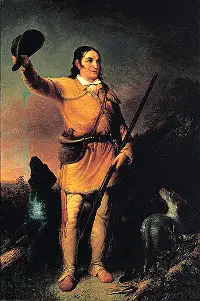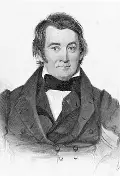Davy Crockett: Frontier Hero
Davy Crockett was an 18th Century American soldier and lawmaker most well-known for his frontier adventures and colorful storytelling. He was born on Aug. 17, 1786, in rural Tennessee (which was at the time part of North Carolina), the fifth of his parents' nine children. The family A 16-year-old Davy returned home for another stint as an indentured servant, to help his father pay off the family debts. The second indenture was with John Canady, on whose land the Crockett family lived; Davy continued to work for Canady. In 1806, Crockett married Polly Finley. They had three children, John, William, and Margaret. Polly died in 1815, and Davy and his children lived with his brother, John, and his wife for a time. He had already moved his family a couple of times. Not long afterward, Davy married again, to Elizabeth Patton, whose husband had died, leaving two children, George and Margaret Ann. Davy and Elizabeth had three child together, Robert, Rebecca, and Matilda. 
Crockett, who learned to fire a gun at age 8 and had early on trained as a woodsman, accompanying his brothers on hunting trips, joined the Tennessee militia in September 1813. He fought as part of the Second Regiment of Volunteer Mounted Riflemen in the Creek War for a few months. He also served during the War of 1812, with the Tennessee Mounted Gunmen. Crockett and his family moved again, to Lawrence County, where he served as a county commissioner and a justice of the peace and was elected lieutenant colonel of the local militia regiment. In 1821, he won election to the Tennessee General Assembly. Just days after the election, the Tennessee River flooded, destroying much of his property. His father-in-law, Robert Patton, gave the couple a large amount of land, and Crockett sold it to help repay debts. After another term in the General Assembly, he ran for Congress, failing in an 1824 opportunity to unseat incumbent Rep. Adam Rankin Alexander. He defeated Alexander two years later and then served one more time in the House. In office, Crockett championed the cause of the poor farmer, personally identifying with their situation, and championing the settlement of land claim disputes and the reduction of taxes. He also became an at times vocal political opponent of Andrew Jackson. He spoke out against the Indian Removal Act of 1830 and was the only person from Tennessee to vote against it. Partly for this reason, he was defeated in the next election. He returned to the House two years later but was defeated for re-election in 1834. Also in 1834, he worked on his autobiography with Thomas Chilton, a Kentucky Congressman. The result was A Narrative of the Life of David Crockett, Written by Himself. Crockett had by this time gained a reputation for being a good speaker and for telling a good story (whether all of the elements of the story were true or not). 
Filled with the need for more exploration, he traveled with 30 other men to Texas, arriving in Nacogdoches in January 1836. He was one of 66 men who signed as a six-month volunteer for the Provisional Government of Texas. He went to San Antonio, arriving there on February 8. He was at the Alamo when a large contingent of the Mexican Army arrived, and he was among the dead when the Siege of the Alamo ended in a victory for Mexico, on March 6. Crockett's renown as a frontiersman and a storyteller grew after his death. |
|
Social Studies for Kids
copyright 2002–2024
David White



 moved several times as Davy was growing up, ending up living on property owned by John Canady. To help pay the family finances, Davy went to work as early as 12, as an indentured servant to rancher Jacob Siler. He went to school the following year but got into a fight and then skipped school, causing his father to threaten him with violence. Young Davy ran away from home and joined a cattle drive to Virginia. In the next few years, he alternated between cattle drives and farm work, followed by a four-year apprenticeship to Elijah Griffith, a hatter.
moved several times as Davy was growing up, ending up living on property owned by John Canady. To help pay the family finances, Davy went to work as early as 12, as an indentured servant to rancher Jacob Siler. He went to school the following year but got into a fight and then skipped school, causing his father to threaten him with violence. Young Davy ran away from home and joined a cattle drive to Virginia. In the next few years, he alternated between cattle drives and farm work, followed by a four-year apprenticeship to Elijah Griffith, a hatter.

